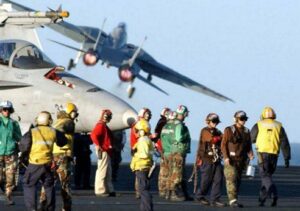Building a successful team is a challenge; getting the right talent onboard, with the right people in the right jobs, is critical. On a U.S. Navy aircraft carrier, it doesn’t matter what color shirt you wear or what department you’re in, one aspect remains constant – the unparalleled power of teamwork. As a fighter pilot, I learned firsthand the significance of unstoppable teamwork in the skies and on the deck of an aircraft carrier.
Teamwork has a dramatic effect on the effectiveness and safety of military operations, but it’s just as true for organizational performance. An effective team can help a company achieve outstanding results. However, a team that is not working, can cause unnecessary disruption, failed delivery, and strategic collapse.
Today, as a board member, executive advisor, researcher, and keynote speaker, I’m fortunate to share my experiences and insights with leaders, board members, and individuals across every industry, revealing the secrets to achieving high performance through the unwavering strength of collaboration.
Let’s take a closer look at how you can bring your team together—whether large or small, diverse or homogenous—and get your people moving in tandem, as wingmen, toward their objectives.
Cultivating Trust: Teamwork is The Cornerstone of Success
In the cockpit, trust is not just an abstract concept; it’s a matter of life and death. Just as I had to trust my fellow pilots with my life, leaders must instill trust within their teams.
Building a foundation of trust among team members enhances cooperation and collaboration, as individuals can confidently rely on each other’s capabilities and intentions. Emphasize transparency, open communication, and a genuine understanding of one another to forge unbreakable bonds within the team.
- Organize team-building activities: Arrange regular team-building exercises and retreats to foster stronger connections among team members, allowing them to get to know each other personally and build trust through shared experiences.
- Encourage open and honest feedback: Create a high-performing culture through Debriefing, where constructive feedback is welcomed and actively sought. This open approach to communication will help team members feel heard and valued, strengthening their trust in the team’s leadership and each other.
- Lead by example: Demonstrate trustworthiness as a leader by being reliable, accountable, and transparent in your actions. Show trust in your team members by delegating responsibilities and empowering them to make decisions, providing opportunities for growth and development.
Effective Communication Strategies for Exceptional Teamwork
Imagine soaring through the skies, where split-second decisions can make all the difference.
Effective communication strategies are the lifeline that keeps a team functioning smoothly.
In aviation, we employ transparent and open channels of communication, ensuring seamless information exchange between team members.
Similarly, leaders must foster a culture of open dialogue, active listening, and clear articulation of objectives to ensure the team remains synchronized and responsive to changing circumstances.
- Implement regular team meetings: Schedule frequent team meetings to ensure everyone is on the same page regarding project updates, challenges, and goals. These meetings are not gab fests. They have a set end time, and are for making sure the team is aligned and to quickly address concerns.
- Utilize communication tools: Leverage technology to streamline communication processes. Implement project management software, messaging apps, and video conferencing tools to facilitate quick and efficient information exchange, especially for remote or geographically dispersed teams.
- Conduct communication workshops: Invest in training sessions focusing on improving communication skills. Workshops on active listening, effective feedback, and conflict resolution can equip team members with the tools they need to communicate more efficiently.
Teamwork and Leveraging Individual Strengths: Fueling Optimal Performance
In aviation, each fighter pilot possesses unique skills and talents. We recognize and utilize these diverse strengths to enhance our squadron’s overall performance.
Similarly, leaders must take the time to understand the individual strengths and abilities of their team members, aligning tasks accordingly. By playing to each person’s expertise, leaders empower their teams to achieve optimal performance, allowing them to collectively excel in ways they never thought possible.
- Conduct skills assessments: Administer assessments to identify the strengths and weaknesses of team members. This data can then be used to strategically assign tasks that align with individual expertise and interests.
- Encourage cross-training: Foster a culture of continuous learning by promoting cross-training opportunities. Encourage team members to share knowledge and develop skills in areas beyond their core expertise, creating a more versatile and well-rounded team.
- Recognize and celebrate achievements: Acknowledge and celebrate the successes of individual team members. Publicly recognizing their contributions boosts morale and reinforces the value of leveraging individual strengths for collective achievement.
Shared Goals for Effective Teamwork: Forging a Unified Purpose
On an aircraft carrier, every operation is guided by shared goals, a unified purpose that brings together diverse individuals into one cohesive unit. Aligning the team’s objectives fosters a sense of belonging and direction, motivating everyone to work towards a shared vision.
Leaders must define clear and achievable goals that resonate with the team, inspiring them to collaborate wholeheartedly and, together, conquer new horizons.
- Involve the team in goal-setting: Creating buy-in is critical. Facilitate collaborative discussions where team members actively participate in setting shared goals. This inclusive approach ensures buy-in and commitment to the objectives, enhancing the team’s sense of ownership and responsibility.
- Communicate the bigger picture: Provide context and connect team goals to the larger organizational mission. When team members understand how their efforts contribute to the overall success, they become more motivated to work cohesively towards shared goals.
- Regularly review and realign goals: Schedule periodic reviews of team goals to assess progress and adjust strategies as needed. These check-ins help keep the team focused and allow for necessary course corrections.
Overcoming Challenges as One: Resilience through Unity
The aviation realm is fraught with challenges, just as any industry faces its share of obstacles.
What sets high-performance teams apart is their ability to overcome these challenges as one.
When we face adversity in the skies, we do not falter but stand united, drawing strength from our teamwork.
Leaders must instill a sense of unity and resilience within their teams, cultivating a spirit that embraces challenges as opportunities for growth and achievement.
- Foster a supportive environment: This is where knowing how to Debrief really is the magic sauce…. Encourage team members to offer help and assistance to one another during challenging times. This collaborative approach reinforces the idea that overcoming obstacles is a collective effort.
- Conduct Debriefs (after-action reviews): Analyze challenges and setbacks as a team to identify valuable lessons and improvements. A constructive review process strengthens the team’s problem-solving abilities and resilience.
- Develop contingency plans: Anticipate potential challenges and develop contingency plans to address them. By having backup strategies in place, the team can respond swiftly and cohesively when faced with unexpected hurdles.
As a pioneer in aviation who pushed boundaries as a fighter pilot, I can attest to the extraordinary power of unstoppable teamwork.
From an aircraft carrier’s deck to a multinational corporation’s boardroom, the principles that govern high-performance teams remain constant.
Cultivating trust, employing effective communication, leveraging individual strengths, setting shared goals, and overcoming challenges are the key pillars of achieving unparalleled success.
In fact, by supporting the critical pillars of unstoppable teamwork, leaders, board members, and individuals across industries can elevate their teams to new heights of high performance and achieve remarkable success.
With unwavering unity and dedication, there are no limits to what we can accomplish together.

Carey Lohrenz, author, aviator, Unstoppable Teamwork: Achieving High Performance Together







